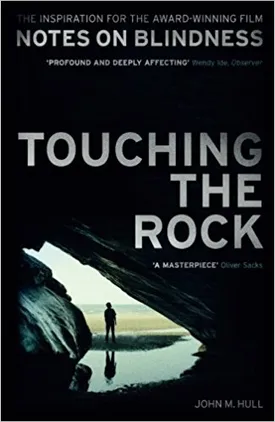Touching the Rock: An Experience of Blindness by John M. Hull
Touching the Rock: An Experience of Blindness by John M. Hull is an autobiographical work exploring Hull's life as a man who became blind in 1980 at the age of 45. For nine years, Hull kept careful notes on his experiences, gathering evidence from his day-to-day life as a blind man. Touching the Rock sketches an intimate portrait of what it truly means to be blind, taking readers behind the scenes into the neglected world of the blind person.
Beginning with a prologue, Hull quickly and confidently establishes his credibility as a narrator. He refuses to mourn his disability, devoting his attention to the the task at hand--understanding the impact of blindness on his life. He acknowledges that although his book is necessarily a subjective exploration, he strived to compose an accurate and meaningful portrayal of his life.
The book is divided into six distinct parts that are loosely linked by chronology and subject matter, though each part stands on its own. The initial chapters of Touching the Rock focus on Hull's experience of and desire to maintain his independence in a world that, in his words, is consciously designed to benefit those who can see. Fittingly, he begins with an exploration of how he perceived and navigated the environment that he had always relied on his sight to observe, cleverly interwoven with musings on how his sighted peers take for granted the simple act of looking.
He next delves into the challenges and anxieties of everyday tasks that people don't necessarily associate with blindness--navigating the ups and downs of social interaction, adapting to public transport, learning certain trades, and even brushing his teeth. Here, Hull draws from personal experiences as well as conversations with friends, family, and other blind people to provide a truly engaging view into the perils and discoveries that accompany life as a blind individual.
The third part of Touching the Rockmay be the most powerful. Hull talks, with heartbreaking detail, of the isolation that he suffered as a result of his disability. He writes about the need for solitude, remarking that “I am more than happy to be alone” and about the people who have helped him adjust to his blindness, from those who work at blindness centers to those he was born to love. Here, Hull reveals his ability to find strength and appreciation in the loveliest of places, such as in the understanding of strangers and in his persistence of tying his own shoes.
In the fourth chapter, Hull talks about his spiritual journey as a blind man, as well as remaining mysteries. He explains that for many years he thought he was too spiritually sophisticated to be affected by a perceived religious narrative. In the presence of darkness, however, he says he came to grapple with the new reality that “everyone, even if they are unaware of it, will hit a wall of mystery at some point.”
Towards the end of the book, Hull strives to uncover further insight into the impact of blindness by visiting blind people in their homes and interviewing them. As his interviews provide revealing lessons on the interconnectedness of blindness and culture, Hull discusses the very personal experiences of those he observed, including being socially excluded or disregarded, or even feeling feared or pitied by those around them. Hull's discussions on the varying cultural expectations of the blind proved deeply revealing, showcasing the vastness of the approaches to blindness around the world.
The book concludes with a poignant recollection of Hull's experience of blindness 13 years after his diagnosis, and he brings his narrative full circle with a discussion of the changes he has experienced since suffering from some more debilitating aspects of his blindness. He reflects on his sturdiness and determination in overcoming these difficulties with a passion and inner strength that have “touched an invisible rock of faith within" him.
Touching the Rock is a remarkable work, offering readers a comprehensive look into the realities of blindness. It offers an intimate portrait of a man who has sought to not just persevere, but to honestly make sense of the world that he lives in. In this way, Touching the Rock is a powerful and affirming exploration of what it truly means to live without sight.

